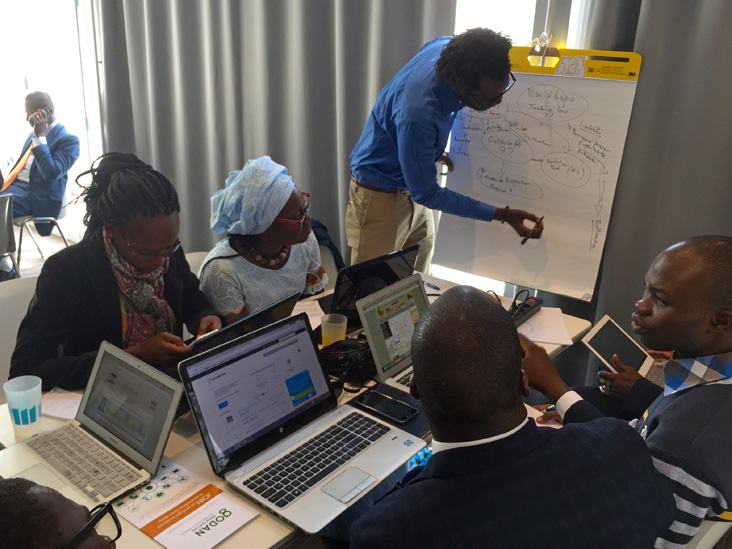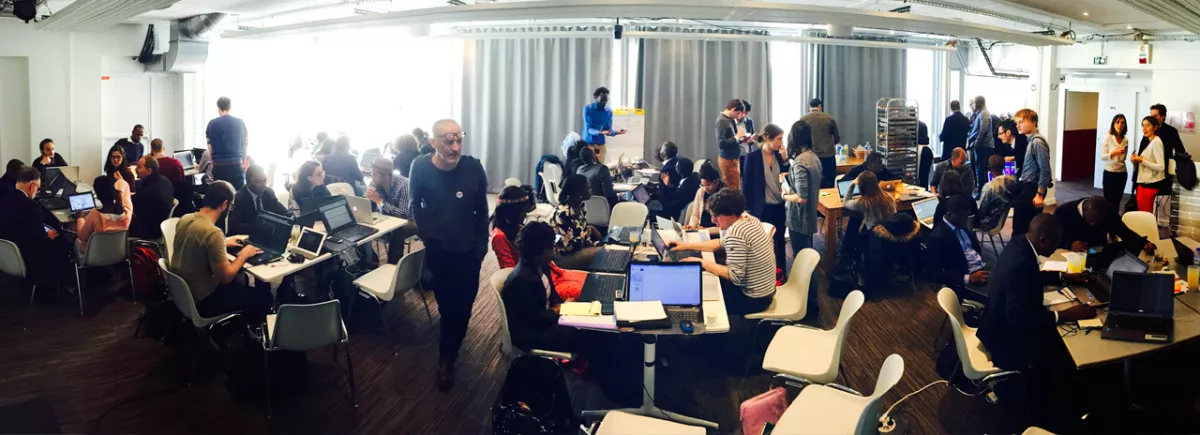
#HackFrancophonie Day 2
Open Data Camp relating to open data in the French-speaking world.
After the
day spent sharing experiences between governments and civil society organisations, the #HackFrancophonie open data camp was held at NUMA on 19 February 2016.
Organised by Etalab, Burkina Open Data Initiative (
BODI), the World Bank and CFI, this day of collaborative teamwork was aimed at developing open data projects in French-speaking countries. In addition to governments and civil society organisations from all over the French-speaking world, the Parisian ecosystem was also heavily involved.
More than a hundred participants contributed to the success of the event! The day resulted in nine projects, some of which are intended to be extended over the coming months.
Open data in French-speaking countries as a raw
material
The participants at the open data camp came up with their projects based on the open data available in French-speaking countries. Although Burkina Faso has developed the
first open data portal in French-speaking Africa, many countries in the region still do not possess such a resource. That's why the participants and the Etalab team, in advance of the event, collected open data in Benin, Burkina Faso, Côte d'Ivoire, Haïti, Mauritius, Mali and Sénégal on the following subjects: Cartography, Democracy, Economy, Education, Population, Security and Health. This data, though often scattered and sparse, was found on Websites for national statistics institutions or on dedicated portals set up by civil society organisations.
A freely consultable and editable
#HackFrancophonie wiki has been created as a central repository for this data.
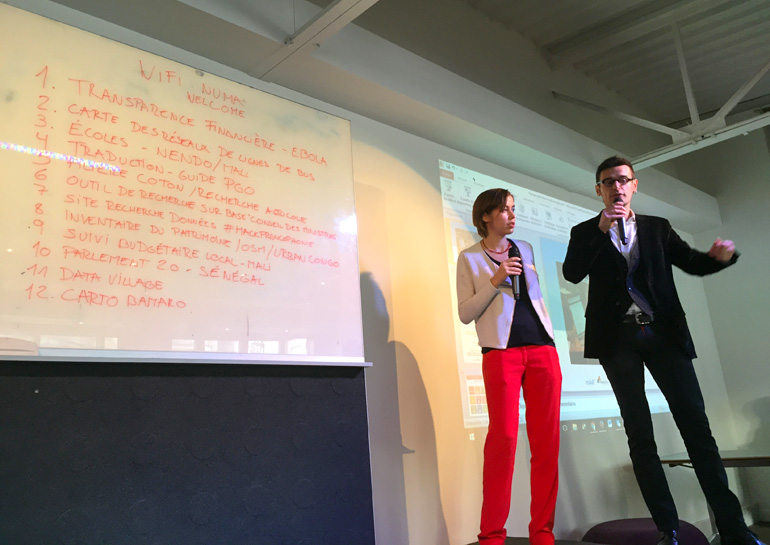
Claire-Marie Foulquier-Gazagnes from Etalab and Julien LeBot, CFI expert, announce the 12 projects
Teams with a range of skills and origins
The teams were formed on the basis of the projects presented by their authors in the morning of the open data camp, and consisted of a mix of members of governments and civil society organisations originating from 8 French-speaking countries spanning 3 continents, in particular Africtivistes, le Balai Citoyen,
Jokkolabs, OpenStreetMap Mali, lefaso.net, WANEP, Savane FM and Social Justice.
Players both in French development, such as the
AFD, INRA or the Ministry of Foreign Affairs, and in international development, such as Paris21, the IFC, OIF or GODAN,, were present at the camp and the French ecosystem, represented among others by OpenDataSoft, by players in cartography such as OpenStreetMap France, CartONG and OSM Espace Francophone, or by NGOs such as République Citoyenne, was also involved.
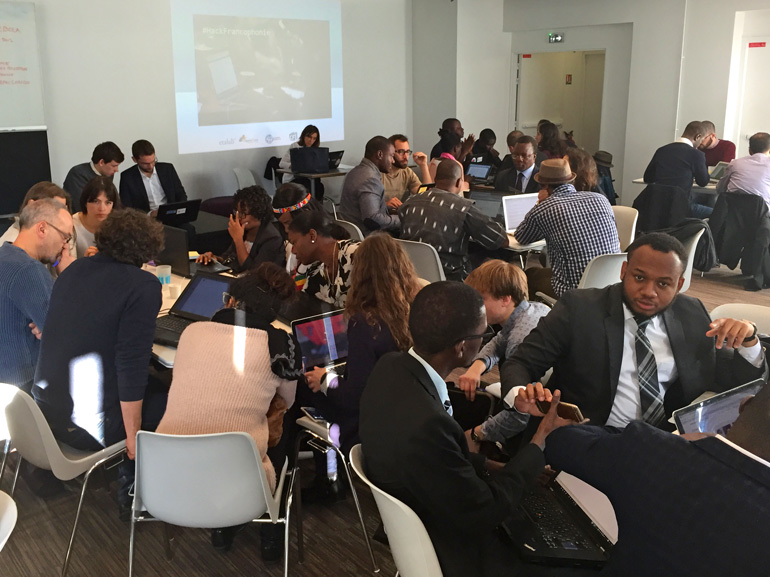
In just one day, the participants launched mapping projects …
The project " Bus network cartography", led by CartONG, took a project that was carried out in Managua (Nicaragua) and transposed it to Antananarivo (Madagascar). Using the OpenStreetMap database, local bus journey data was extracted and displayed over the course of the day. The next step for the project will be to print and distribute paper plans of the network to local residents.
The project "Building cartographic sovereignty together" was used t o remotely map the city of Bamako (Mali). Thanks to the OpenStreetMap task manager, participants on the ground were able to coordinate their efforts with the team in Paris in relation to task 1075. On this occasion, a number of participants at the open data camp were able to begin the task of remote mapping, with the assistance of members of OpenStreetMap Mali and Espace OSM Francophone.
…educational projects
The authors of the project "Our Schools, Our Data V2", created by the Burkina Open Data Initiative, developed a second version of their application during the day, which enables the government to more effectively plan where schools should be built and enables parents to make an informed choice about where their children go to school. A more refined tool for locating schools in Burkina Faso and a search engine were developed and should be rolled out on the platform soon.
The project "
Schools in Mali: where to invest?" used open data in Mali to identify the geographical areas where schools should be set up, in order to solve the problems of inequality surrounding access to education. The first lessons were learned by identifying, using a finer granularity for the data, the areas in which a shortage of teachers per school had been recorded.
This work could help to guide the choices made by public decision-makers in Mali in terms of town planning.
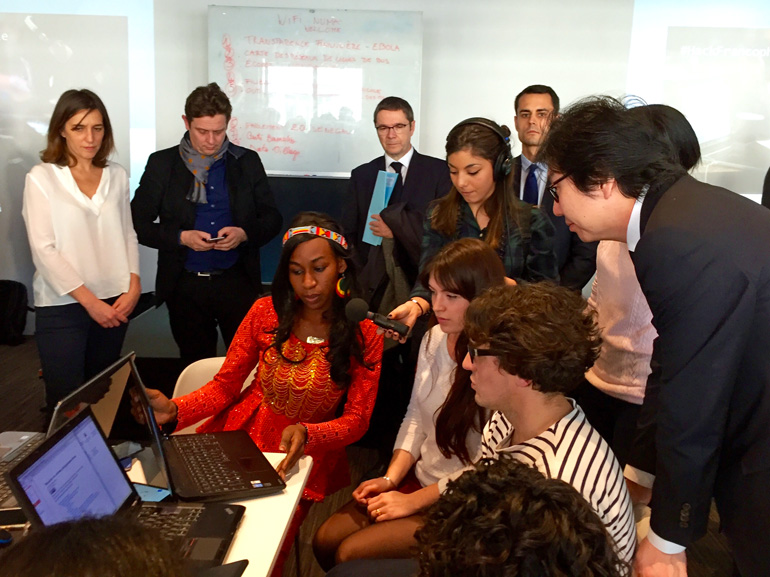 #Hackfrancophonie was visited by Jean Vincent Placé, Secretary of State to the Prime Minister, who is responsible for State reform and simplification
#Hackfrancophonie was visited by Jean Vincent Placé, Secretary of State to the Prime Minister, who is responsible for State reform and simplification
…democracy projects
The project "
Fais GAF – Gouvernance Accès Facile" exploited the data collected by the news Website le.faso.net regarding decisions taken during the Council of Ministers in Burkina Faso in order to ensure greater accountability for these decisions, which may involve appointments, but also the awarding of public contracts. Over the course of the day, the team was able to turn these reports into a database.
The next step for the project will be to develop a search engine and a notification system in relation to this data.
The project "
Data Village" proposed a discussion space based on local data, in conjunction with an open data platform. The forum focuses on the question of how to manage decentralised communities in Côte d'Ivoire (municipal and regional councils) and seeks to promote the best practices with regard to participative democracy and local governance.
The project is
open for contributions.
The project "
Parliament 2.0" was inspired by the approach taken by Regards Citoyens with nosdeputes.fr in France in order to create a portal for monitoring parliamentary activity in Senegal. During the day, the team identified exploitable data sources and also developed strategies for mobilising citizens, in particular by means of SMS, and tools for analysing data.
The next step for the project will be to develop an ad-hoc portal for the sub-region.
…and economic and financial projects
The project "
Cotton sector", which is supported in particular by the INRA, the IFC and GODAN, defined a strategy for using open data to improve cotton productivity in Burkina Faso, namely by analysing soil moisture data and meteorological data.
A local hackathon continuing to explore this subject may be organised.
The project " Ebola financial transparency" tracked the flows of expenditure relating to the health system in Mali during the Ebola epidemic. The team showed the potential of an impact study on the aid that is granted in the wake of health crises. The participants came across financial data that lacked standardisation and was not kept up-to-date, hampering their efforts at analysing the data.
